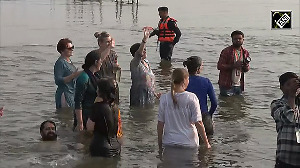Prime Minister Atal Bihari Vajpayee on Thursday slammed the developed world, expressing concern over the imbalances in the development agenda of trade negotiations.
He said the development dimension of the Doha round of the World Trade Organisation meet was not ' receiving sufficient attention ' and called for India and the Association of South East Asian Nations to 'arrest this trend.'
Delivering the inaugural address at the 2nd India-ASEAN Business Summit, he pointed out that it was being held on the eve of the WTO Cancun meet starting September 9-14.
"We try to highlight the asymmetries and imbalances in the multilateral trade agreements, but keep getting side-tracked into non-trade related issues. We are finding that the Doha agenda negotiations are a two-tracked process with our concerns always on the slower track," the prime minister said.
"All of us are painfully aware that the development dimension of the Doha Round is not receiving sufficient attention," he said, adding that India, ASEAN and other developing countries should fight the asymmetries and imbalances in the multilateral agreements.
"It is in the hands of ASEAN, India and other developing countries to arrest this trend," Vajpayee said.
"We have to insist that the multilateral trading regime takes into account the genuine concerns of the not-so-rich countries for the welfare and livelihood of billions of their citizens," he added.
Underscoring that agriculture was one such issue that affected not just economics but also the society and politics of the concerned countries, he pointed out that millions in these nations were dependent on agriculture and thus had a vital stake in achieving outcomes in conformity with the interests of the people.
"India and some ASEAN countries, together with a number of other countries, have taken some important initiatives which should gain further momentum as we approach Cancun," he said.
He pointed out that India and ASEAN had common concerns on Singapore issues and on non-agricultural market access.
"We have recently put behind is the contentious issues of TRIPS and public health. We hope the same spirit permeates through other negotiations on the Doha agenda. The issue of transfer of technology to the developing countries from the developed countries requires equal attention," Vajpayee stated.
He noted that trade and investment were the basic building blocks of the India-ASEAN relationship and the trade between them now exceeded $10 billion 'but is has barely scratched the surface of its potential.'
He said India-ASEAN must aim high and target a turnover of $15 billion over the next two years and $30 billion by 2007.
Companies from ASEAN countries were participating in India's ambitious infrastructure development programme, he noted, adding that India had a ' priority programme ' for a vast network of highways throughout the country.
"We welcome investment and technological inputs in the modernisation and expansion of our major airports and ports. India has committed $12.5 billion in this fiscal year alone for the development of national highways, airports and convention centres. There are obvious opportunities for ASEAN countries in these infrastructure projects," the prime minister pointed out.
According to Vajpayee, India could share with ASEAN countries its expertise in space technology for developmental applications like natural resources mapping, flood forecasting and hydrology. They could also expand this cooperation to the manufacture and launch of remote sensing and communication satellites for itself and other countries.
"We can offer this service to ASEAN countries at considerably less cost than what they incur at present," Vajpayee said.
Additional inputs: PTI






 © 2025
© 2025